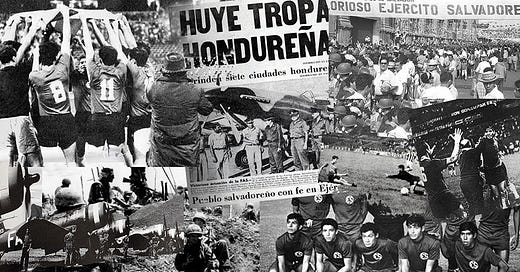Those who subscribe to ConcaCorner may have noticed something - I haven’t been in your inbox for a while. While there are numerous reasons for that, the primary one is that I am working on a new project! Most of the time I have available for ConacConer has been spent reading, researching, and procuring interviews for a new project!
The Football War/Guerra del fútbol also referred to as the “100 Hour War” was the name given to the armed conflict between Honduras and El Salvador in 1969. Before the onset of the war, the countries faced off in a series of qualifiers for the 1970 World Cup. The matches consisted of rioting in the stands, political statements before the games, and intense battles on the pitch.
If you have any awareness of this war or do brief searches online, it is clear that the war was not started because two countries obsessed with soccer faced off to attempt to qualify for their first World Cup … it was much deeper than that.
Sport is one of the things in this world that can be used by people to promote national and international unity, connect communities as a universal language, and create platforms for change. Because of its power and influence, it can also be used by people and governments as a propaganda tool to divide and set people against each other. As I will delve into this project, there was a lot of the latter at play in this conflict.
Soccer became a tool to stoke a fire that was already burning for the decades leading up to the war. A fire that was started by outside intervention, land disputes, xenophobia, media propaganda, and much more that we will explore together.
You might be asking, why put in the time to tell a story about something from 50+ years ago? Several reasons:
Understanding history (especially the parts that are overlooked or untold) is important for us to have context for past events.
This conflict had lasting effects on both nations along with the region at large that can help us understand why things are the way they are today.
We can learn from the dangers of what led up to this conflict as many of the themes are still at play today in the region and around the globe.
Many simply don’t know or choose to ignore the impact that US corporate and government involvement has on this region and this war specifically.
A reminder for us to use the beautiful game to connect and unite across barriers rather than using it to reinforce them.
I am still working through the best format to release this long-form project. As of today, I am leaning toward a narrative podcast with written transcripts for those who prefer to read it, but it may end up being a fully written format.
I also want to invite you all to be a part of this project. Many of you are not only fans of the beautiful game in the Concacaf region but also have deep connections and ties to the people and places throughout. If there is something I should read or listen to as part of my research or someone I should connect with and interview, please let me know!
Lastly, it isn’t lost on me that many of the topics covered in this series are sensitive and potentially controversial. The events of this conflict impacted real people in real places. My intent, as always, is to present the information and discuss the past and present consequences with the utmost respect.
I look forward to bringing this to you in 2025! In the meantime, there may be a handful of posts and interviews but not at the level you may be accustomed to. Thank you in advance for your patience as I work on this project!





